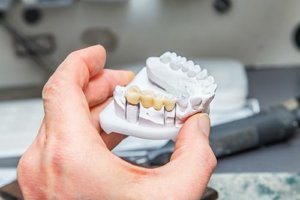Facing your reflection with missing teeth can feel painful and damaging to your self-confidence. But dental bridges complete your smile, replacing missing teeth or filling gaps for a natural, healthy appearance. Your dental team at S. Keith Mahan, DDS provides bridges and other solutions to keep you smiling for years to come.
Dental bridges use existing teeth or dental implants to support a bridge and false teeth called pontics. The supportive teeth, called abutments, hold the bridge securely on each side of the gap where teeth are missing. Pontic teeth consist of gold, metal alloys, porcelain or some of these materials combined.
Benefits of Dental Bridges
 Dental bridges fill gaps in your smile for a complete, healthy and natural look. Filling missing tooth gaps helps you properly chew and speak, despite tooth loss. A bridge also helps maintain your face shape, preventing an appearance of early aging. Bridges keep healthy teeth from shifting out of alignment and into the open space, as well.
Dental bridges fill gaps in your smile for a complete, healthy and natural look. Filling missing tooth gaps helps you properly chew and speak, despite tooth loss. A bridge also helps maintain your face shape, preventing an appearance of early aging. Bridges keep healthy teeth from shifting out of alignment and into the open space, as well.
When your dentist discusses dental bridges with you, options include four main types of these appliances. But not all will be suited to your individual needs. You must weigh options against other forms of tooth replacement to find the right fit.
The four types of bridges in dentistry today include:
Traditional dental bridges that rely on teeth on each side of your missing tooth gap to support the pontic made of porcelain and metal or ceramic. This is the most common type of bridge.
Cantilever bridges are the least recommended type of bridge, as these cause greater wear and tear on your healthy teeth. A cantilever uses the support of only one tooth for a pontic. That places an immense amount of pressure on the existing tooth and causes damage for many people.
Maryland bonded bridges utilize plastic, porcelain or porcelain-metal pontics. These bridges also feature plastic gums on a framework bonded to healthy teeth on each side of the bridge.
Implant-supported bridges replace several missing teeth, using dental implants for pontic support. The result is a supportive, comfortable and secure bridge that does not damage the surrounding teeth like other types of bridge appliances. This process usually requires two or more surgeries over the span of five months or more, to complete the process.
Maintaining Good Oral Health with Bridges and Other Appliances
Dental bridges and other dental appliances or implants can last a lifetime. You only must take good care of them, just as you care for your own natural teeth. Sometimes these devices experience damage, loosen or fall out. In those cases, you must visit your dentist immediately, beyond your regular twice-annual visits. Routine professional teeth cleanings and oral exams enable your dentist to help you maintain your bridge and natural teeth.
If you receive a bridge, you must avoid eating some of the same foods restricted by other types of dental work, such as braces and retainers. You cannot crunch ice, hard candies or popcorn kernels, for example. These can break your dental work.
Sticky, gooey foods also cause problems for bridges. Avoid caramel, taffy and some sticky gums, to prevent damage to your bridge.
Orlando, Florida Bridges and Other Dental Care
In Orlando, Florida, S. Keith Mahan, DDS provides quality dental care for your whole family. This treatment includes options for tooth replacement, such as with dental bridges, dental implants, and other appliances.
Dentistry provided S. Keith Mahan, DDS include:
Keeping your family’s teeth healthy and strong starts with your first visit to S. Keith Mahan, DDS. From there, you need regular visits twice each year for exams and professional cleanings. Keeping up with this dental care schedule saves you time and money over the long term.
If you or someone in your family experiences loss of permanent teeth and needs dental bridges or other options for tooth replacement, call Dr. Mahan’s office today. Set your appointment at 407-841-7241.
